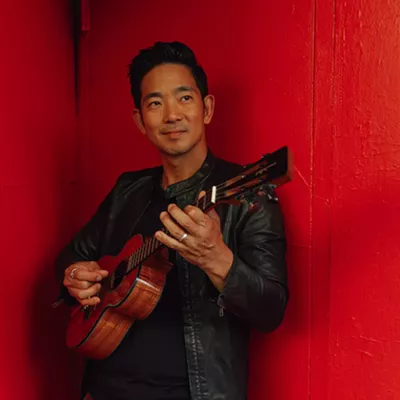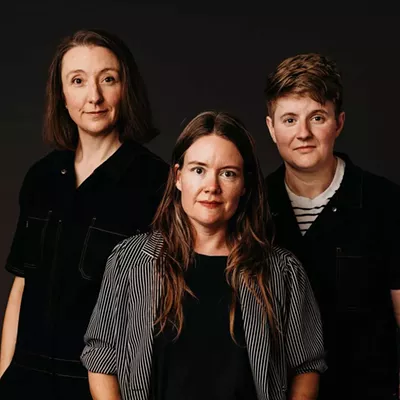For miles, there are houses and rows upon rows of green yards and perfect gardens with respectable cars parked in the driveways. There are parks. There are families walking in big bunches with dogs on leashes and little ones crammed into front and backpacks. On a cloudy late-summer day, this section of Spokane Valley is the picture of ordinary.
This forgettable part of a sprawling place is where the members of Blackwater Prophet live, and where they come from. With the exception of some straggly hair and a few tattoos, to some people they might be forgettable too. They work at Pita Pit and Domino’s. They’re quiet until they get some liquor in them, then they giggle a lot. It seems like the odds were stacked against them to be anything but ordinary.
So the first time you hear Blackwater Prophet’s far-from-ordinary sounds, it’s a revelation. Their songs are swampy and thick, driven by the interplay between 21-year-old Nicholas Parker’s quaking bass lines and 22-year-old Bryan Coats’ drums. That gives Blackwater Prophet its vibe; Garrett Zanol, another 22-year-old, gives the band its soul. He hunches over his guitar, adding solo after solo of distorted psychedelic riffs, singing and moaning into the microphone like he’s asking for forgiveness. It’s dark, fierce, aching rock ‘n’ roll, wrought out of instinct. These songs are dispatches sent directly from a dark, primal place in their hearts.
The band’s genesis story? It’s ordinary. After Coats and Zanol jammed for years, they invited Parker — they call him Beav — to play along one night. Lightning struck.
“We wrote a song that night, and then just scrapped all the old shit,” Coats says. “We were a new band. So it just kind of happened like that.”
They weren’t expecting this bluesy style to come out — they’d previously played in indie bands. But when they got together, a deep, lurching, heavy blues rock came out, and Zanol started writing songs about things that really mattered to him. They weren’t just songs of heartbreak or love lost — though there are a few of those. “Wicked Ways” talks about a friend who was molested for nearly a decade by his stepfather.
On the back porch of the ordinary house Zanol shares with a roommate — who announces mid-interview there’s no toilet paper left and comes downstairs while the band practices to take a video of himself flipping them off — he explains that his friend confessed what was happening to him for the first time.
“Jesus! We play this music, and I didn’t even know,” Coats says, dumbstruck. “How are we learning this the same time you are?”
They laugh, passing around a bottle of whiskey and chasing each pull with a swig of Pepsi. They don’t need to talk much about what they’re going to say in their songs, or how they’ll play them. They jam until they create something that they love, plain and simple. And what comes out is always artful and driving and a little sloshy.
The band has been playing for awhile, and they’re still surprised when they perform to empty venues or clubs dotted with the few friends who come out to drink and yell “faggot!” at the stage while they play. They feel this music. They know it’s good. They wonder what they need to do to get noticed — to seem less like ordinary kids from Spokane Valley.
“If people knew our music and we were somewhat known,” Zanol says, dragging on a cigarette, “it’s like maybe there’s a chance that other people will make music that’s not bullshit in this town. Or they’ll listen to us and be like, ‘Hey, there’s something going on here. There’s a little diamond in the rough. F--- their names, I don’t care who they are: this music is alright.’”
“For like 10 years now, I’ve been like, ‘I need to be in a thing that turns everything around,’” Parker chimes in. And this is it, he says. This is that band.
The interview reverses itself. They ask how to get popular, how they get people to pay attention, how to get the good shows and play to the right people. They can’t tour — they work at Pita Pit, for chrissake. How do they get known in their own hometown?
“Can we just catch a break and then have Rolling Stone f---ing give us a cover? And then get a record deal?” Coats says, smiling. “Do you know how we can do that? I want a simple solution.”
They’re so worried about the future, about what they want and could be and how to get there. About the what-ifs and what-could-bes. But right now — right here in this backyard — is the best it’s ever going to be. If a record deal propels them to stardom and fame and girls and money, they’ll always wish for these days: days when they played music that came from their hearts. For Saturdays when all they had to do was be carefree and smoke cigarettes and play music in their basement.
They’ll ache for the days when they were ordinary, and life was just a big open road ahead of them.
Blackwater Prophet with Odyssey, Hooves and Entanglement • Sat, Sept. 14 at 7 pm • The Hop! • 706 N. Monroe St. • $5 • All-ages • 328-5467

















